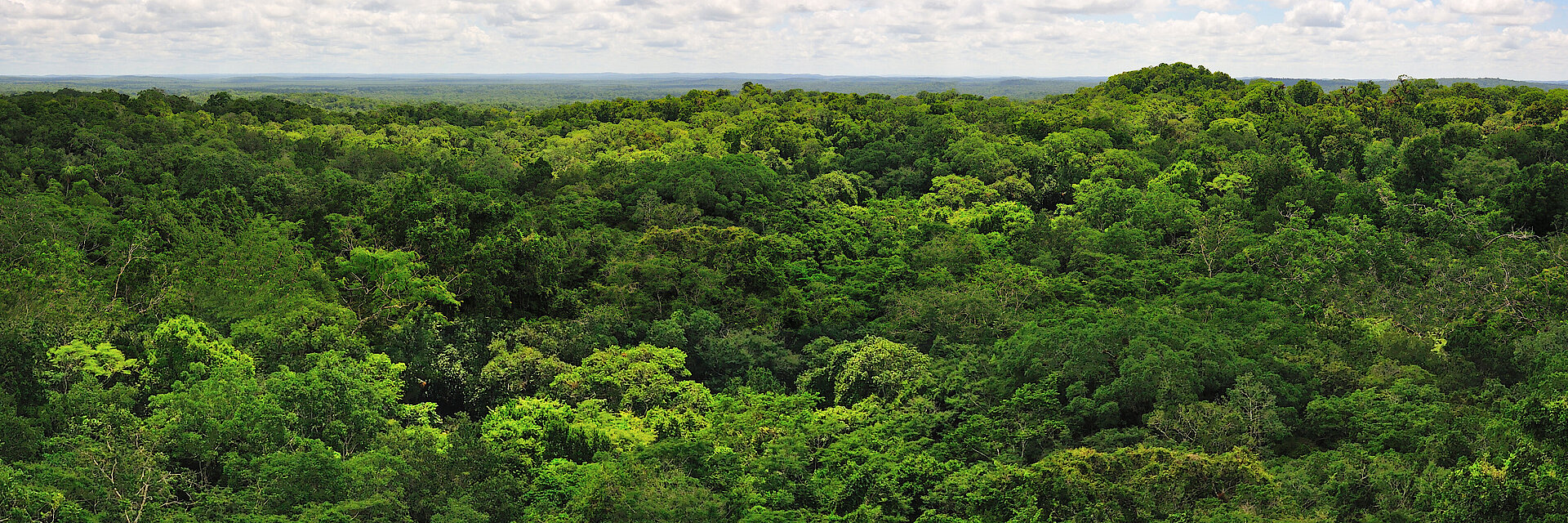Rainforests are unique ecosystems

Special ecosystems
The rainforest stretches around the earth like a green belt and covers almost 6% of the earth's surface. Even if it only covers a small area, it is extremely important for nature and for us humans: the world's rainforests produce no less than 40% of the Earth's oxygen, regulate microclimate, wind and precipitation, provide a home for more than four-fifths of the animal and plant species living on land and are also important climate stabilizers as significant carbon sinks.
Did you also know that plants from the rainforest are important components of our medicines? Around 25 % of our modern medicines contain active ingredients from tropical plants. These are used, for example, to treat malaria, heart disease, bronchitis, diabetes and rheumatism. In addition, our diet would be relatively monotonous without the rainforest. Almost 80 % of our food originally comes from the tropical rainforests, such as bananas, oranges, lemons, corn, rice, potatoes, coffee, cocoa and vanilla.
Rainforests are under severe threat
World Rainforest Day aims to draw attention to this fascinating and at the same time threatened ecosystem. The state of the rainforests is critical, the world's rainforests are becoming smaller and smaller and, according to the Food and Agriculture Organization of the United Nations, are still under serious threat. More than half of the world's forests have already been destroyed by humans, a large proportion of them in the tropics. At 157 million hectares, the loss of tropical forests, for example, accounted for more than 90% of global deforestation between 2000 and 2018 - roughly equivalent to the size of Western Europe.
Unsustainable forms of land use and intensified agricultural production processes are particularly responsible for the destruction of rainforests. For example, the disappearance of forests is caused by monoculture cultivation or the expansion of cattle pastures, which exert great pressure on forests. Deforestation for the production of food and other agricultural goods thus leads to environmental destruction and contributes to the climate crisis. Almost 90% of deforestation worldwide can be attributed to the expansion of agriculture.
Other causes of deforestation include urban sprawl and the expansion of infrastructure, which often cuts wide swathes through intact forests and results in the increasing fragmentation of forests that are still intact. The exploitation of natural resources such as iron ore, gold or oil also leads to the continuous destruction of this important ecosystem. If the destruction of the rainforests continues at this rate, the rainforest may disappear completely by the end of this century, according to experts - and with it a carbon sink that is important for the global climate.
Rainforest protection is climate protection
Against the backdrop of climate change, species extinction and the massive encroachment on intact nature, it is obvious that the current deforestation of tropical forests cannot simply be allowed to continue. Deforestation releases three times more harmful CO2 every year than the remaining tropical forests can absorb in a year.
Solutions to end deforestation, particularly in the context of agricultural systems, already exist and, according to the United Nations, must include several aspects: the preservation of existing forests, the restoration of degraded areas and the expansion of agroforestry. In addition, climate researchers have repeatedly come to the conclusion that natural climate solutions, such as forest conservation and sustainable agriculture paired with reforestation, can make an immense contribution to climate protection.
Help protect the rainforest!
World Rainforest Day is a reminder that we can all take action to protect the rainforest. As a climate partner of the Blue Planet Certificate, you can actively contribute to the protection of rainforest areas in Costa Rica.
In the south of Costa Rica there are still large lowland rainforests, home to a unique diversity of species. But here too, the forest is under threat from grazing and plantation farming, poaching and logging. We want to create a green rainforest bridge between two globally important national parks. Your carbon offset contribution goes directly to this forest conservation project in Costa Rica.
Together, we can stop deforestation and protect forests in the long term!